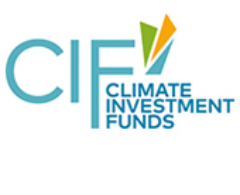Climate Investment Funds (CIF)

The Climate Investment Funds (CIF) is a multidonor fund, set up by the World Bank in 2008. The International Bank for Reconstruction and Development (IBRD) of the World Bank Group serves as the trustee of the CIF.
The CIF is composed of four programs:
- The Clean Technology Fund has invested USD 5.6 billion to support middle-income countries in particular, with high concessional loans to scale-up the demonstration, deployment, and transfer of renewable energy, energy efficiency, and sustainable transportation technologies.
- The Pilot Program for Climate Resilience ( PPCR ) with a portfolio of USD 1.2 billion so far, aims to support developing countries to integrate climate resilience into development planning. The PPCR also offers additional funding to support public and private sector investments for implementation activities.
- The Scaling Up Renewable Energy in Low Income Countries (SREP) has allocated USD 780 million to support the deployment of renewable energy solutions to foster access to energy and economic growth in the world’s poorest countries.
- The Forest Investment Program (FIP) worth USD 775 million has supported the efforts of developing countries to reduce deforestation and forest degradation. The FIP also supports the promotion of sustainable forest management for emission reductions and the enhancement of forest carbon stocks ( REDD +).
By the end of 2017, the CIF accumulated USD 8.3 billion from 14 developed countries and provided resources to 72 developing countries for GHG emission reduction and resilience building actions. It is estimated that the funds provided by the CIF have attracted an additional USD 58 billion through the co-financing of a portfolio of over 300 projects.
Eligibility to Receive Funding
All developing countries that are party to the UNFCCC are eligible for CIF funding. The applicant country needs to develop an approach, which consists of a programming and an implementation phase. The programming phase is used to develop an investment plan to target investments which are in line with, and reinforce national development priorities. The investment plan is developed in consultation with MDBs (e.g. the Asian Development Bank) and key stakeholders, including civil society, indigenous peoples and the private sector. Following the programming phase and endorsement/approval of the investment plan, the focus shifts towards implementation and bringing projects into reality.
Regional Focus: The CIF has no specific regional focus. The following examples illustrate the broad range of projects funded by the CIF:
- In Africa, the Clean Technology Fund (CTF) is for example using its private sector window to support the 100 MW Sere Wind Farm in South Africa.
- In Kenya, the SREP (Scaling up Renewable Energy in Low Income Countries Program) is supporting a 150 MW geothermal power plant.
Sector Focus
The aforementioned four programs define the sectoral priorities of the CIF. In these areas, CIF concessional loans provide financial means at flexible conditions to: test new business models and approaches, to collect experiences in new markets, and to incentivise investors to unlock additional finance from other sources, particularly from the private sector and multilateral development banks.
Funding Conditions
Countries access the CIF through the MDB in their region, which administers the climate investment funds, while both private and public entities execute the project’s implementation. With the approval of the Trust Fund Committee, the trustee makes commitments and transfers the CIF resources to the MDBs. Taking Africa as an example, at the end of 2017, the African Development Bank (AfDB), supported 39 CIF projects. In Bangladesh, the Asian Development Bank (ADB) is administering PPCR funds.
Application Procedure
If a country decides to apply for any of the CIF funds, it has to go through the MDB in the region. The sub-committee responsible for the respective program (CTF, FIP, PPCR, and SREP) then assesses the proposal and makes the funding decision, supported by experts. If approved, the funds are allocated to the regional MDB for transferring to the recipient.
Contact
Climate Investment Funds c/o The World Bank Group MSN MC 4-406, 1818 H Street, NW Washington,
DC 20433 USA
Tel: +1-202-458-1801
E-mail: CIFAdminUnit@worldbank.org

